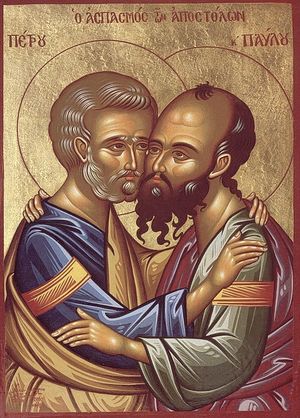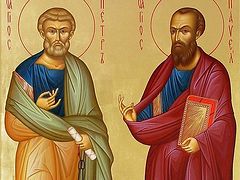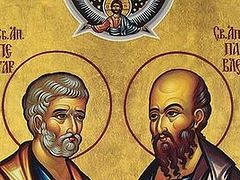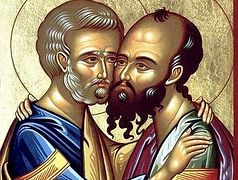 The Holy Church celebrates the memory of the Apostles Sts. Peter and Paul on July 12 (June 29, Old Calendar). They were contemporaries, were well acquainted with one another, and both ended their respective lives on earth with martyrdom in Rome, the capital city of the Empire, approximately 60 years after the Nativity of Christ.
The Holy Church celebrates the memory of the Apostles Sts. Peter and Paul on July 12 (June 29, Old Calendar). They were contemporaries, were well acquainted with one another, and both ended their respective lives on earth with martyrdom in Rome, the capital city of the Empire, approximately 60 years after the Nativity of Christ.
The Church celebrates the Apostles Sts. Peter and Paul both on the same day, first of all because they are living symbols of two ways different ways of apprehending God and had two different visions of the Apostolate.
Peter demonstrates the full power of faith of which the sincere and guileless heart of a simple Galilean fisherman may be capable. His Epistles have been preserved in the New Testament, and there is every reason to believe that the Gospel according to Mark, the second of the four Gospels, is a record of the Apostle Peter’s preaching. That Gospel, comprised of fewer chapters than the other three, is the digest of an eyewitness account. In the Epistles of St. Peter, we sense the Apostle’s mature religious experience and wisdom, but his Epistles are not marked by the subtle ideation or the crafted argument that characterize the Epistles of St. Paul.
While Peter was a simple fisherman, Saul – as the Apostle Paul was known before his conversion – stood at the pinnacle of the culture of his time, and was schooled not only in Jewish religious tradition, but also in the areas of Greek philosophy and literature.
In jointly honoring these two Apostles and in calling them “Preeminent,” the Church shows its reverence both for the simplicity of a believing heart, and for an intellect grounded in God.
Typically, faithful who since childhood have been accustomed to reading the Gospels almost never turn to the Epistles – including those of St. Paul – contained in the New Testament. On the other hand, those who come to the Faith consciously, who come as adults and who have rejected their former indifference to or lack of belief in Christ, constantly refer to the Apostle Paul’s Epistles, reading them throughout their entire lives, each time finding something new in them.
Sometimes it is difficult to follow the stream of the Apostle Paul’s thought, but whoever takes on the task of reading all of the Epistles in his native language, and supplements that reading with the commentaries of the Holy Fathers on the Epistles, will learn many new things that will be of use in his spiritual life and in his coming to know God. A serious reader who reflects upon what he has read will come to see that in a mystical manner, the writings of the Apostle Paul are contemporary: it would be more accurate to state that their wisdom and lofty inspiration have not been subject to the times and have not become dated. Everything that the Apostle Paul says to us about sin and holiness, about the Law and grace, about the spiritual struggle of prayer, and about many other things, is truly relevant today and unto the ages.



